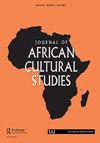“图提人正在失去独特性”:图提岛Maḥas族谱文献与归属建构
IF 0.9
2区 社会学
Q2 CULTURAL STUDIES
引用次数: 0
摘要
摘要图蒂岛是苏丹首都大喀土穆的一座河岛,位于青尼罗河和白尼罗河的交界处。通过记录他们的家谱,图蒂岛的一些居民构建了一个关于该岛和马的起源和早期定居的历史叙事ḥ作为住在那里的大家庭。对于许多马ḥ对于图蒂人来说,记录他们的家谱是克服他们对该岛失去独特性的恐惧的一种方式,因为通过城市总体规划,该岛被设想为一个海滨开发区。他们希望通过将自己家族的历史附在岛上,来维护自己的归属感。此外,该岛的一些家谱学家将他们的家谱追溯到他们的祖先从苏丹北部移民到图蒂岛之前。马的社会异化ḥ正如图蒂人所经历的那样,在驱使人们将他们的家谱和家族历史附属于马的“原始”土地Qāmī方面发挥着至关重要的作用ḥ就像图蒂岛一样,建造一个想象中的家园。本文章由计算机程序翻译,如有差异,请以英文原文为准。
“Tuti is Losing its Uniqueness”: Genealogy Documentation of the Maḥas of Tuti Island and the (De)Construction of Belonging
ABSTRACT Tuti Island is a river island located at the junction of the Blue and the White Nile in Greater Khartoum, the capital region of the Sudan. Through the process of documenting their genealogies, some of inhabitants of Tuti Island have constructed a historical narrative about the origins and early settlement of the island and of the Maḥas extended families who live there. For many of the Maḥas of Tuti, documenting their genealogies is a way of overcoming their fear about the island losing its uniqueness, because of urban master plans through which the island is envisioned as a waterfront development. By attaching their families’ histories to the island, they hope to assert their sense of belonging. Moreover, some of the island’s genealogists have traced their genealogical lines as far back as the time before their ancestors migrated from northern Sudan and ended up on Tuti island. The social alienation Maḥas Tuti are experiencing plays a vital role in driving people to attach their genealogies and family histories to Qāmī, the “original” land of the Maḥas of Tuti island and construct an imagined homeland.
求助全文
通过发布文献求助,成功后即可免费获取论文全文。
去求助
来源期刊

Journal of African Cultural Studies
Multiple-
CiteScore
1.70
自引率
10.00%
发文量
13
期刊介绍:
The Journal of African Cultural Studies publishes leading scholarship on African culture from inside and outside Africa, with a special commitment to Africa-based authors and to African languages. Our editorial policy encourages an interdisciplinary approach, involving humanities, including environmental humanities. The journal focuses on dimensions of African culture, performance arts, visual arts, music, cinema, the role of the media, the relationship between culture and power, as well as issues within such fields as popular culture in Africa, sociolinguistic topics of cultural interest, and culture and gender. We welcome in particular articles that show evidence of understanding life on the ground, and that demonstrate local knowledge and linguistic competence. We do not publish articles that offer mostly textual analyses of cultural products like novels and films, nor articles that are mostly historical or those based primarily on secondary (such as digital and library) sources. The journal has evolved from the journal African Languages and Cultures, founded in 1988 in the Department of the Languages and Cultures of Africa at the School of Oriental and African Studies, London. From 2019, it is published in association with the International African Institute, London. Journal of African Cultural Studies publishes original research articles. The journal also publishes an occasional Contemporary Conversations section, in which authors respond to current issues. The section has included reviews, interviews and invited response or position papers. We welcome proposals for future Contemporary Conversations themes.
 求助内容:
求助内容: 应助结果提醒方式:
应助结果提醒方式:


